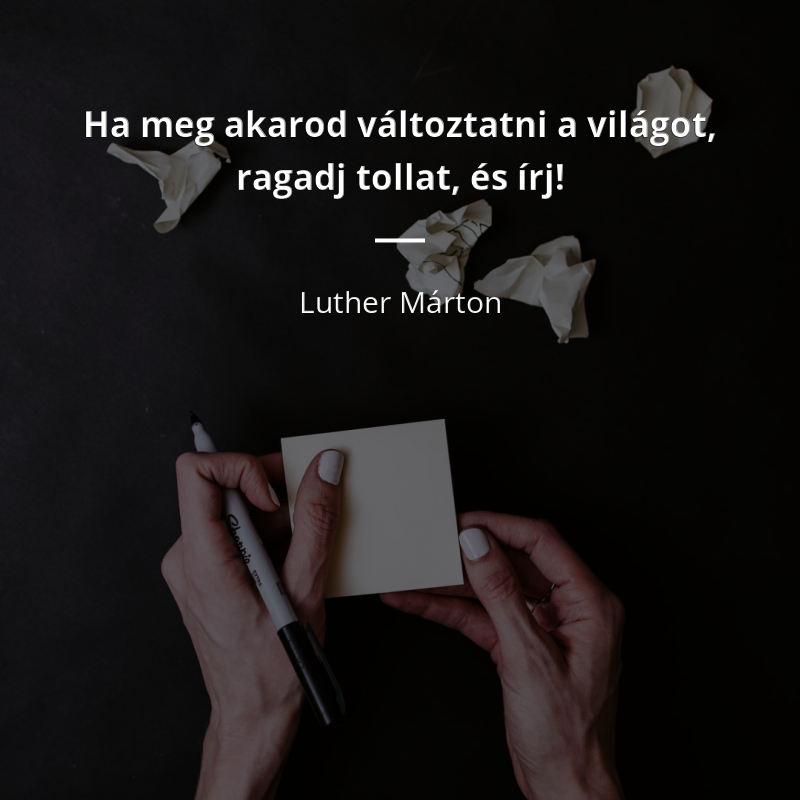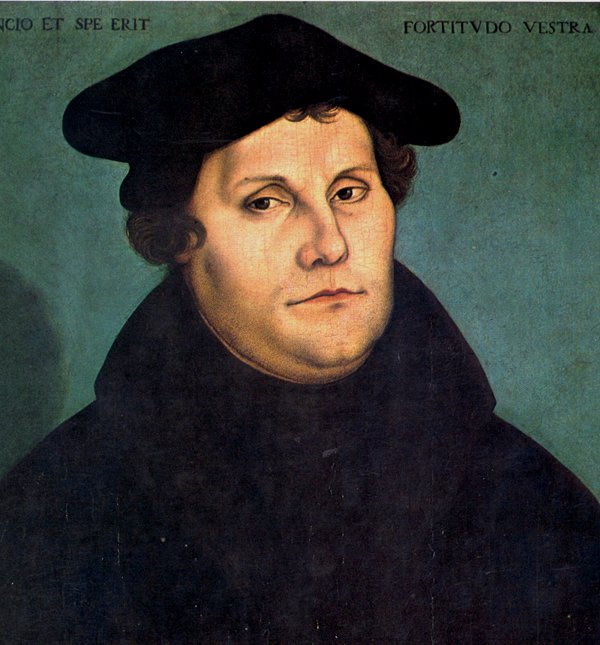
Luther Márton híres idézetei
Luther Márton Idézetek az erőről
http://hu.wikipedia.org/wiki/Er%C5%91s_v%C3%A1r_a_mi_Isten%C3%BCnk
Luther Márton Idézetek Istenről
„Itt állok, másként nem tehetek. Isten segítsen meg. Ámen.”
Állítólagos beszéde a Worms-i birodalmi gyűlésen. 1521 Április 18
Eredeti: Hier stehe ich, ich kann nicht anders. Gott helfe mir. Amen.
Luther Márton idézetek
„Az Értelem… az ördög legnagyobb szajhája.”
Eredeti: Vernunft... ist die höchste Hur, die der Teufel hat.
„Hála neked uram, mert azt hittem, hogy csak én vagyok így ezzel.”
Egy Luther-anekdota
„Doktor úr, nagyon nagy baj van.”
Mi a baj?
Az, hogy néha én magam sem hiszem, amit prédikálok.
Egy Luther-anekdota
Luther Márton: Idézetek angolul
Ein' feste burg is unser Gott,
ein gute wehr und waffen.
Er hilft uns frei aus aller not,
die uns itzt hat betroffen.
Psalm. Ein feste Burg ist unser Gott (1529), translated by Frederic H. Hedge, reported in Bartlett's Familiar Quotations, 10th ed. (1919)
Literal Translation: A firm fortress is our God,
a good defense and weapon.
He frees us from all need,
that has struck us.
Complete hymn, Pennsylvania Lutheran Church Book translation, at Wikisource
Luther's Works, 47:45; cf. also Anderson, Stafford & Burgess (1992), p. 29
"Heidelberg Disputation: Thesis 7" (1518), http://bookofconcord.org/heidelberg.php#7
752 http://books.google.com/books?id=ZUAuAAAAYAAJ&q=%22The+reproduction+of+mankind+is+a+great+marvel+and+mystery+Had+God+consulted+me+in+the+matter+I+should+have+advised+him+to+continue+the+generation+of+the+species+by+fashioning+them+of+clay+in+the+way+Adam+was+fashioned%22&pg=PA307#v=onepage
Table Talk (1569)
Forrás: The Freedom of a Christian (1520), pp. 75-76
Let them be killed.
Sermon on Exodus, 1526, WA XVI, p. 551 as quoted in Luther on Women: A Sourcebook, edited by Susan C. Karant-Nunn, Merry E. Wiesner-Hanks, (2003), p. 231
Forrás: The Freedom of a Christian (1520), p. 51
That These Words of Christ, 'This is My Body' Still Stand Firm Against the Fanatics, 1527, in Luther's Works, Word and Sacrament III, 1961, Fortress Press, , volume 37, p. 54. http://books.google.com/books?ei=PxdBTeK6F4PogQe9lKizAw&ct=result&id=J-0RAQAAIAAJ&dq=%22Nicodemus%2C+joseph%2C+Paul%22&q=%22Still+Stand+Firm+Against+the+Fanatics%22#search_anchor This work appeared in vol. 2 of the Wittenberg ed. of Luther's Works (in German) and was later translated into Latin by Matthew Judex (Matthaeum Iudicem) under the title: Defensio τοῦ ρητοῦ Verborum Cenae: Accipite, Comedite: Hoc est Corpus Meum: Contra Phanaticos Sacramentariorum Spiritus. http://solomon.tcpt.alexanderstreet.com/cgi-bin/asp/philo/cpt/getobject.pl?c.121:1.cpt
Luther's Latin: “Nullus ex patribus, quorum infinitus est numerus, de Sacramento sic loquutus est, ut Sacramentarii. Nam nemo ex iis talibus verbis utitur Tantum panis & vinum est: Vel Corpus & Sanguis Christi non adestProfecto non est credibile, nec possibile cum toties ab iis res ista agatur & repetatur, quod non aliquando, vel semel tantum excidissent haec verba. Est merus Panis, aut, non quod Christi corpus corporaliter adsit, aut his similia, cum tamen multum referat ne homines seducantur, Sed omnes praecise ita loquuntur, quasi nullus dubitet, quin ibi praesto sit corpus & sanguis Christi. Sane ex tot patribus, & tot scriptis, ab aliquibus, vel saltem ab uno potuisset negativa sententia proferri, ut in aliis articulis usitatum & frequens est, si non sensissent, corpus & sanguinem Christi vere inesse. Verum omnes concordes & constantes uno ore affirmatium proferunt.” See Luther's Opera Omnia, Wittenberg ed., (1558), vol., 7, p. 391. http://books.google.com/books?id=jrpjO-K_kQYC&pg=PR10&dq=Accipitae+Hoc+%22corpus+meum%22+luther&hl=en&ei=9iFBTeOqIonbgQeJ4IXmAQ&sa=X&oi=book_result&ct=result&resnum=1&ved=0CCkQ6AEwAA#v=onepage&q=coenae&f=false
Sermon for the Second Sunday in Advent, Luke 21:25-36 (1522) http://www.trinitylutheranms.org/MartinLuther/MLSermons/mlserms_original.html, as translated in The Precious and Sacred Writings of Martin Luther (1905) edited by John Nicholas Lenker
Forrás: Against the Heavenly Prophets in the Matter of Images and Sacraments (1525), p. 91
Forrás: Temporal Authority: To What Extent It Should Be Obeyed (1523), p. 89
Commentary on the Magnificat (Das Magnificat), A.D. 1521
<cite>Luther's Works</cite>, American Edition, vol. 21, p. 326, ed. Jaroslav Pelikan, Concordia Publishing House, 1956. ISBN 057006421X
“Superstition, idolatry, and hypocrisy have ample wages, but truth goes a-begging.”
53
Table Talk (1569)
To the Christian Nobility of the German States (1520), translated by Charles M. Jacobs, reported in rev. James Atkinson, The Christian in Society, I (Luther's Works, ed. James Atkinson, vol. 44), p. 207 (1966)
Forrás: The Freedom of a Christian (1520), p. 80
Luther's Works, 21:326, cf. 21:346
Luther's works Vol. 7 (1965), Lectures on Genesis, Chapters 38-44
“I cannot forbid a person to marry several wives, for it does not contradict Scripture.”
Letter to Chancellor Gregory Brück (An Den Kanzler Brück), 1524-01-13, in Dr. Martin Luther's Briefe, Sendschreiben und Bedenken: volständig aus den verschiedenen Ausgaben seiner Werke und Briefe, aus andern Büchern und noch unbenutzten Handschriten gesammelt. From the Wilhelm Martin Leberecht De Wette Collection of Luther's Letters (Berlin: Georg reimer http://www.degruyter.de/rs/222_5927_ENU_h.htm, 1826) vol. 2, p. 459 (Letter DLXXII; Latin text)
Forrás: The Freedom of a Christian (1520), p. 76
Small Catechism http://www.ccel.org/ccel/luther/smallcat.text.i.5.html|The, The Fifth Commandment, (1529)
Forrás: A Sincere Admonition to All Christians to Guard Against Insurrection and Rebellion (1522), pp. 62-63
Forrás: Dictionary of Burning Words of Brilliant Writers (1895), p. 409.
A Commentary on St. Paul's Epistle to the Galatians (1535. Translation revised 1953 by Philip S Watson. On Galatians 1:4.)
“An armed insurrection … would hinder and bring into disrepute this spiritual insurrection.”
Forrás: A Sincere Admonition to All Christians to Guard Against Insurrection and Rebellion (1522), p. 68
Wer anders lehret, denn ich hierinn gelehret hab, oder mich darinn verdammt, der verdamt Gott, und muß ein Kind der Höllen bleiben.
Deutsche Antwort Luthers auf König Heinrichs von England Buch. German answer of Martin Luther to the Book of King Henry of England, 1522.
Dr. Martin Luther's Sämtliche Werke, Polemische Deutsche Schriften, Johann Konrad Irmischer, Erlangen, 1833, vol. 28, p. 347. http://books.google.com/books?id=838KAQAAIAAJ&pg=RA1-PA347&dq=%22Wer+Anders+lehret,+denn+ich+%22&hl=en&ei=loo_TMbkOYL88AbH-rCGCw&sa=X&oi=book_result&ct=result&resnum=10&ved=0CFgQ6AEwCQ#v=onepage&q=%22Wer%20Anders%20lehret%2C%20denn%20ich%20%22&f=false
Statement while being confined to residence at Coburg, as quoted in History of the Christian Church, (1910) http://www.ccel.org/ccel/schaff/hcc7.ii.ix.vii.html by Philip Schaff, Vol. VII : Modern Christianity : The German Reformation, § 123. Luther at the Coburg; though it mentions Muhammad, this remark might actually be directed at those responsible for his confinement, as he makes allusions to dwelling in the "empire of birds" and his location as a "Sinai" and regularly uses other uncomplimentary comparisons of those involved in suppressing his ideas to figures unpopular to himself and his contemporaries.
Forrás: A Sincere Admonition to All Christians to Guard Against Insurrection and Rebellion (1522), pp. 67-68

